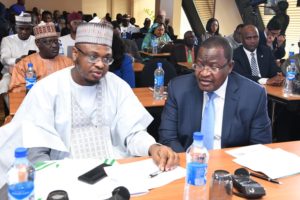By Martin Ekpeke
In the last seven years, Prof. Umar Danbatta as the Executive Vice Chairman of the Nigerian Communications Commission (NCC), has carted home several awards, recognitions and honours. A feat, which many industry watchers believe couldn’t come for free.
A cursory check on the citations during some of these occasions, compared with the achievements of the former University lecturer, indicates that those awards, recognitions and honours are well-deserving.
Of recent is the 2022 Vanguard Regulator of the Year Award, which was conferred on Danbatta in recognition of the EVC’s effective regulatory achievements through cutting-edge initiatives, especially during his first five years in office during which Nigeria’s telecom sector has shown spectacular landmarks.

Other Selected Honours are:
- 2022 Vanguard Regulator of the Year Award
- Man Of The Year 2020, Money Report Magazine
- Outstanding Accomplishments In Emergency Management (SEMA 2020).
- Most ethically compliant and integrity-driven regulatory agency of the year -ICPC
- Award Of Excellence By Head Of Civil Service Of The Federation
- Telecom Personality Of The Year ICT Watch Awards
- Government Agency Of The Year (Beacon Of ICT Awards)
- Most Responsive CEO Of The Year (Public Service) By House Of Representatives Press Corp (2018)
- Personality Of The Year By The Lagos Chamber Of Commerce Industry, Mines And Agriculture
- Chief Executive Officer Of The Year (Tell Magazine)
- Quality Achievement Award For Best Practices By European Society For Quality Research (ESQR) 2017
- European Award For Best Practices 2016 By An EU Organisation In Brussels, Belgium.
Are these honours deserving?
Here comes a man on the assumption of first tenure in 2015, rolled out 8-point agenda, which was factored upon a tripod of Availability of Service, Accessibility of Service and Affordability of Service. The triple-A, forms the basic principle or pillars upon which the 8-Point Agenda stands.
The 8-point agenda are the facilitation of broadband penetration, improvement in service quality, optimization of spectrum benefits, promotion of ICT innovations and investment opportunities, facilitation of strategic collaboration and partnerships, consumer protections and empowerment, and promotion of fair competition and inclusive growth and regulatory excellence and operational efficiency.
The diligent implementation of NCC’s Strategic Vision Plan (SVP1), which focused on the 8-Point Agenda has helped to lift broadband penetration from 6 percent in 2015 to 42.02 percent by July 2020. The sector’s contribution to GDP increased from 8.50 percent in 2015 to 14.30 percent in the second quarter of 2020. In financial terms, telecom contribution in Q2 2020 contribution translates to N2.272 trillion.
This earned him a second tenure in 2020, when the Nigerian President, Muhammadu Buhari unsurprisingly decided to extend his tenure. According to the Minister of Communications and Digital Economy, Prof. Isa Pantami, who recommended Danbatta for a second tenure, the renewal of the appointment was to consolidate the gains made in the telecommunications sector in line with the National Digital Economy Policy and Strategy.

Confirmed by the Senate for his second tenure of five years, Prof. Danbatta sprang into action again by unveiling the 5-Points agenda, which includes facilitating attainment of 70 percent broadband penetration by 2025; consumer protection and empowerment; consolidation of spectrum trading, continuous SIM registration audit and creation of Emergency Communications Centres (ECCs) in more states of the federation.
Since 2020 till date, this 5-point agenda has been faithfully executed by the Commission, which he led. Also, as a follow-up to the Strategic Vision Plan (SVP1) to take the Commission to greater heights, the Danbatta-led NCC launched the Strategic Vision Plan (SVP2) in 2021
The Strategic Vision Plan (SVP) 2:
In developing the new SVP (2021 – 2025), the Commission took cognizance of five visions namely: Organizational Renewal for Operational Efficiency and Regulatory Excellence; Facilitating the Provision of Infrastructure for a Digital Economy which fosters National Development; Promote Fair Competition, Inclusive Growth, Increased investment and Innovative Services; Improve Quality of Service (QoS) for Enhanced Consumer Quality of Experience (QoE); and Facilitate Strategic Collaboration and Partnership.

Other Key achievements of Danbatta
National GDP Growth
According to data released by the National Bureau of Statistics (NBS), the Information and Communication Technology (ICT) industry contributes 18.94% to the nation’s Gross Domestic Product (GDP) as at the second quarter of 2022. The Telecommunications sector alone, which is majorly regulated by the NCC currently contributed 15% to GDP as of the second quarter of 2022 up from 8.5% in 2015 when Danbatta came on board.

Indigenous participation
As of today, the Nigerian government through the Nigeria Office for Developing the Indigenous Telecoms Sector (NODITS), which is domiciled in the Nigerian Communications Commission (NCC), has strengthened indigenous participation in the telecom sector. A lot of indigenous companies have been encouraged to compete in the sector. Readily come to mind is the saving of about $12 million from the ban on Subscriber Identity Module (SIM) importation. Nigerian companies are now the sole manufacturers of SIM cards in Nigeria and have manufactured over 100 million SIM cards in the last year.
Telecom Investment
In 2001, investment in the country’s telecom sector was less than $500 million. Even in 2015 when Danbatta assumed office, the investment profile was $38. This has risen to over $70 billion. Also, active telecoms subscribers today are 208 million from about 400,000 aggregate telephone lines in the country as of 2000. This represents a teledensity of 109.47%. Basic Internet subscriptions grew from zero ground to 152 million currently while broadband subscriptions stand at 85 million, representing a 44.49% penetration as of July 2022.
Broadband
Broadband Internet is the basis through which the digital economy is being anchored. The Nigerian Communications Commission is led by Prof. Danbatta is aware of this and has consistently found new ways and initiatives to deepen broadband penetration in the country. One of the initiatives is the licensing of Infrastructure Companies (InfraCo). The NCC has increased the number of licensed Infrastructure Companies (InfraCo) from 2 in 2015 to six as of today. The essence is to deploy broadband infrastructure across the 774 Local Government Areas in Nigeria. All in an attempt to realise the new national broadband penetration target of 70 percent by 2025. Also, with the regulatory process of NCC, there has been a reduction in data by well over 75% from $11.15 in mid-2014 to $2.78 at the end of 2019. Today, the average cost of data has come down to around N500 from N1000 per Gigabyte of data, considering the fact that most operators now offer 2GB of data for N1000.

Revenue for government
Never in the history of the telecom sector since its liberalization in 2000 had the sector contributed revenue to the federal government as it did last year. In fact, the sector turned to a revenue spinner for the government owing to the auctioning of 3.5Ghz spectrum to deploy 5G network last year. This also makes Nigeria the first country to embark on a trial of 5G technology in West Africa. The information available shows that the NCC raked in over $500 million which was remitted into the federal government’s Consolidated Revenue Fund (CRF), as prescribed by law. This is not part of the N344.71 billion the Commission generated and remitted between 2015 and early 2020.
Consumer protection
The Nigerian Communications Commission declared 2017 as the Year of the Consumer. Following the declaration, the Commission came up with various consumer-centric initiatives aimed at protecting the rights, interests and privileges of the consumers. One of such initiative is the introduction the Do-Not-Disturb (DND) 2442 Short Code for consumers to stop cases of unsolicited marketing messages on their respective networks. Also, the Commission created a second layer complaint toll-free line, 622 for consumers to escalate complaints to the level of the Commission.
Cybercrime
Aware that cybercrime is a big menace that must be tamed as more Nigerians continue to adopt technology to run their individual life and businesses, the NCC, under Danbatta decided to create the Center for Computer Security Incident Response (CSIRT) in 2021 with the overall mandates to ensure continuous improvement of processes and communication frameworks to guarantee the secure and collaborative exchange of timely information while responding to cyber threats within the sector.
Today, the NCC CSIRT is an industry-specific intervention, whose objectives are aligned to the National Cybersecurity Policy and Strategy (NCPS) published by the Office of the National Security Adviser (ONSA).


